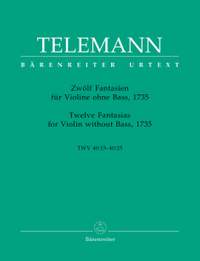Recording of the Week,
Telemann Fantasias from Alina Ibragimova
Alina Ibragimova continues her exploration of unaccompanied violin repertoire in today’s Recording of the Week. Having recorded Bach’s sonatas and partitas and Ysaÿe’s six sonatas, and more recently having whiled away the hours of Covid lockdowns by learning, mastering and recording Paganini’s fiendish 24 Caprices, she now turns to Telemann’s solo fantasias.
Where Paganini’s goal was to showcase his own technical prowess, and to stretch that of anyone tackling his Caprices, Telemann’s is almost exactly the opposite. Self-published in an entrepreneurial fashion, his fantasias are written to be playable by the talented amateur, in order to maximise the number of people who might want to buy a copy. While Telemann’s savvy self-promotion may jar with our preconceptions of art being pure, lofty and unsullied by such real-world considerations as the need for artists to eat and pay the rent, those business instincts clearly didn’t stand in the way of his writing music of great beauty.
 The first thing that struck me, in the very first track, was an unexpected sense of lonely vulnerability. The fact that Telemann starts many of these fantasias off with a slow movement is hardly unique in and of itself, since Bach’s solo violin works often do the same as do innumerable other sonate da chiesa, but somehow it lends the Fantasia No. 1 in B flat, and indeed the album as a whole, a profundity that I simply wasn’t anticipating.
The first thing that struck me, in the very first track, was an unexpected sense of lonely vulnerability. The fact that Telemann starts many of these fantasias off with a slow movement is hardly unique in and of itself, since Bach’s solo violin works often do the same as do innumerable other sonate da chiesa, but somehow it lends the Fantasia No. 1 in B flat, and indeed the album as a whole, a profundity that I simply wasn’t anticipating.
Throughout the set of twelve fantasias, Ibragimova reproduces that sense of delicacy numerous times, particularly in slow movements such as the opening Piacevolmente of No. 8 in E major. But her slow playing is by no means all meek, mild and sentimental; the nobility that she lends to the opening Adagio of No. 3 in F minor rivals the well-known first movement of Bach’s BWV1001 in G minor, though her approach (and particularly her generous use of rubato and breathing-room between phrases) puts a relatively introverted spin on the music that contrasts with the bravado of Bach’s show-stopping spread chords. She’s also evidently put serious thought into tying these fantasias – brief as they are – together into suites with a coherent thread running through each of them, since the way she treats that Adagio in turn sets up the following movement, marked Presto, to feel measured and controlled rather than feisty and exuberant.
Given their origin, naturally there’s nothing about these fantasias that seeks to be comprehensive, run the gamut of any facet of music, or make any authoritative statement. Nevertheless, the range of moods that they cover is wide, and it should come as no surprise that Ibragimova relishes every single one of them; from the melodramatic double-stopping of the fleeting second movement of No. 4, the rumpus of the gigue that follows it and the wistful, unhurried aria that opens No. 7 to faint echoes of the Scottish Highlands in the Allegro of No. 8 or the unconventional opening of No. 9 in a minor-mode Siciliana. Telemann was also not shy about displaying his skill as a contrapuntalist; half of these fantasias incorporate a fugue, perhaps enticing prospective buyers with the prospect of impressing their friends through creating the illusion of a duet.
It might seem odd to be praising so highly a performance of music that is, by design, not especially challenging. Alina Ibragimova has proved herself many times over to be capable of bounding over musical assault courses, so why are we listening to her take a stroll through the park? In truth the “mass-market” music composed for ordinary people to enjoy performing is no less valid than works of finger-breaking technical wizardry, and indeed in such capable hands as Ibragimova’s the shaky boundary between music “for professionals” and “for amateurs” breaks down altogether. Telemann’s craft in keeping the music playable is obvious, but Ibragimova shows us the art that he put into these twelve fantasias – each one an assembly of perfectly-formed one- or two-minute miniatures, forming an album of bite-size delights.
Alina Ibragimova (violin)
Available Formats: CD, MP3, FLAC, Hi-Res FLAC, Hi-Res+ FLAC
Bärenreiter Urtext edition
Available Format: Sheet Music
Alina Ibragimova (violin)
Available Formats: 2 CDs, MP3, FLAC
Alina Ibragimova (violin)
Available Formats: CD, MP3, FLAC, Hi-Res FLAC
Alina Ibragimova (violin)
Available Formats: 2 CDs, MP3, FLAC, Hi-Res FLAC







